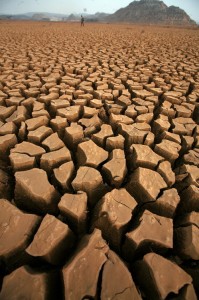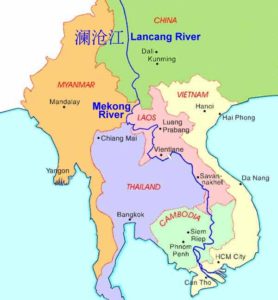
A barren reservoir in China's southwestern Yunnan province
An epic drought is ravaging the Mekong River basin, destroying crops and endangering livelihoods. From the the river’s origins in western China, where it is known as the Lancang, and along its winding route through the countries of the southeast Asian peninsula, record high temperatures and low precipitation have brought the Mekong so low as to halt river trade. One Chinese analyst surmised the resultant shortages in rice crops could mean inflation in China or further destabilize of North Korea, reportedly once again near famine.
Unfortunately for this beautiful part of the world, a tense regional dispute over dams and river management is compounding this environmental crisis. As the prospect of global warming and increased water shortages looms, so too does the risk of future geopolitical conflict over the region’s lifeblood, Mekong river water.
The current row pits Thailand and its neighbors against China. Thailand’s Prime Minister on March 7 called for China to better consider the water needs of downriver nations, and Thai officials have since urged the other member nations of the Mekong River Commission (MRC) – Laos, Vietnam and Cambodia – to jointly exert diplomatic pressure on Beijing to this end. Thai anger over China’s water management policies – often driven by civil and environmental organizations – has flared up periodically in the last decade, most recently in 2008 when the Mekong flooded.
China, which considers its hydropower facilities a matter of national security, has long frustrated MRC member government officials with its lack of transparency on hydrological statistics and been accused of insincerity in its commitment to cooperate in river management. This past March 25th, however, Beijing finally acceded to diplomatic pressure and agreed to share information from two of its dams, partially soothing Thai sentiment, according to the Bangkok Post.

Map of the Lancang-Mekong (www.japanfocus.org/data/mekong-map.jpg)
Beijing’s recent conciliatory gesture was appreciated in Thailand, but the Mekong basin nations may not be through the worst of this dispute. The MRC is set to focus on drought response coordination at its at its annual summit beginning this Saturday, but one Thai politics professor predicted this will really be about “discussing how to force China to release water from its dams,” Chinese state media reported. While the MRC’s exact agenda is not yet clear, pressure to make such demands against China is building from influential Thai activist groups, who will insist on stronger diplomatic action against China in a forum to be held alongside the MRC meeting.
China, its own southwest nearing humanitarian crisis due to the same drought, is likely to find such demands galling. One Yunnan University expert interviewed in the liberal Chinese paper Southern Weekend dismissed the dispute as “not really competition for river water as much as a hyping-up of water politics.” Many independent scientists in fact support China’s scientific claims and do not think its dams caused the Mekong’s historically low water levels in Northern Thailand and Laos. Perhaps as a result, Southeast Asian officials have been careful to toe this line.
By all indications, these regional neighbors’ mutual interest in keeping up positive relations will probably win out in this dispute, even if the MRC antagonizes China at this weekend’s summit.
Nevertheless, the odds are that Mekong issues may endure as a source of regional friction in the future. With Himalayan glaciers receding and the number of dams on the Chinese portion of the Mekong set to double, water management disputes may in fact only get worse. Thailand’s inclination towards environmental activism and China’s penchant for massive environmental engineering projects (and secrecy) is likely to continue to breed conflict. This clash of styles is evident in Beijing’s repetition of its stance that only 14% of Mekong river water originates within its borders, a misleading statistic that has irked downriver nations.
Some officials are yet more pessimistic on the direction of water scarcity issues. The head of Thailand’s National Disaster Warning Center, Smith Dhanrmasaroja, had this to say (from Voice of America):
Of course they will fight. Each country they will fight for water. We will have a war, a water war in this region and people when they need to water to drink you know they will fight for everything. So conflict between Lao, Thai, Myanmar, Kampuchea (Cambodia), that thing is going to happen – we will wait and see.
If this statement is indicative of Thai sentiment regarding the likely effect of water shortages, Beijing’s environmental diplomacy will face serious tests in the years to come. If it doesn’t want to be seen by some in the Southeast Asian public as exacerbating a slowly unfolding regional disaster, China will need to do everything it can to show its sincere interest in being part of the solution. Treacherous waters may be ahead.
UPDATE: Willy Lam at the Jamestown Foundation has since come out with a detailed piece on “China’s Ecological Woes” and their strain on regional relationships. He points out the sensitive debate playing out in independent media and the internet on whether the Yunnan drought is a “natural disaster” or “man-made disaster,” with some scientific evidence pointing supporting the latter contention. Lam also highlights India’s displeasure with China’s plans to dam and divert the Yarlung Tsangpo river, another river that begins in China’s western highlands and then downstream becomes a primary source of water for a foreign region. In the case of the Yarlung Tsangpo, that region is northern India and Bangladesh.